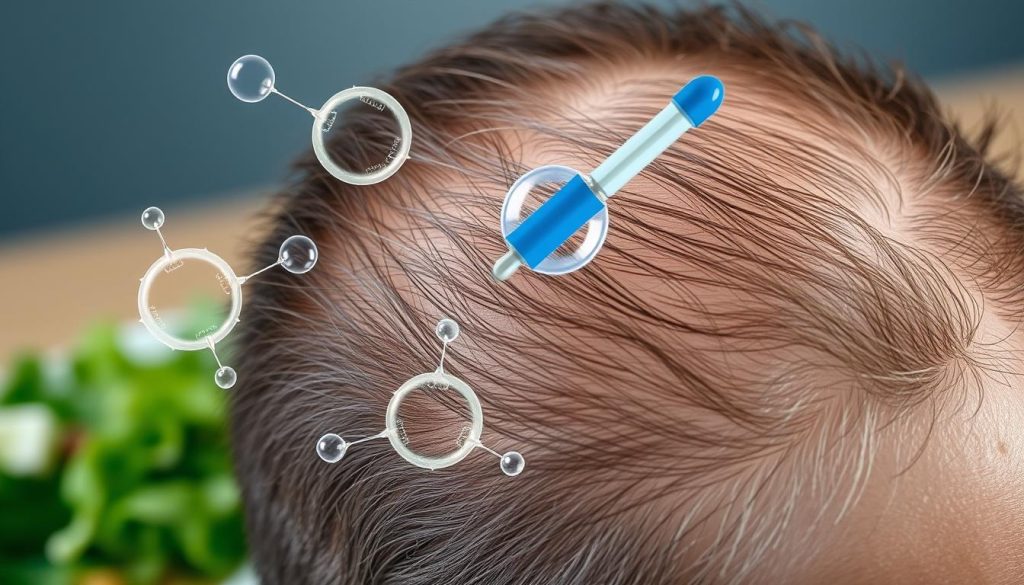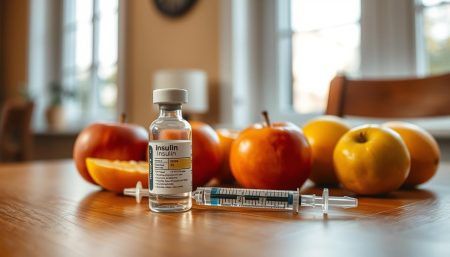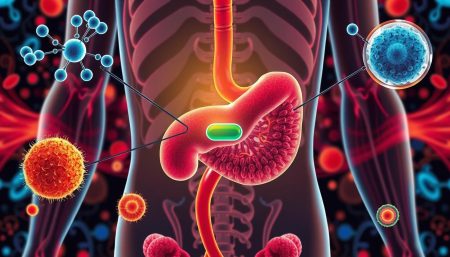Diabetes means more than just managing blood sugar. It also comes with side effects like hair loss. Doctors say people with diabetes might lose hair due to their condition. This change can be upsetting, but it’s a common issue for many.
It shows how important it is to take care of both diabetes and hair health. Knowing why hair loss happens can help those with diabetes find better ways to manage their condition.
So, can diabetes cause hair loss? Yes, it can. Diabetes affects the body in many ways, including hair health. Changes in blood sugar and hormones can weaken hair follicles, leading to more hair loss. This article explores how diabetes and hair health are connected, aiming to help those who may be dealing with this issue quietly.
Key Takeaways
- Understanding the direct impact of diabetes on hair is vital for effective management and treatment.
- Both high blood sugar levels and insulin can play a role in hair health, contributing to hair loss.
- Identifying diabetes-related hair loss signs is crucial for early intervention.
- Nutritional deficiencies in diabetics can exacerbate hair thinning and loss.
- Effective diabetes management is key in preventing and mitigating hair loss complications.
Exploring the Link Between Diabetes and Hair Health
Diabetes affects more than just major organs. It also impacts hair health. Blood sugar control, hormone balance, and circulation play key roles in hair follicle health.
How Blood Sugar Levels Affect Hair Follicles
Unstable blood sugar levels harm hair follicles. High blood sugar reduces blood flow to the scalp. This makes it hard for the scalp to get the nutrients and oxygen needed for hair growth.
This lack of nutrients weakens hair strands. It also shortens the hair growth phase. This leads to more hair loss and thinner hair.
The Role of Insulin in Hair Growth
Insulin and hair health are closely connected. Insulin resistance, common in type 2 diabetes, disrupts hormonal balance. This can lead to higher androgen levels, shrinking hair follicles and shortening the growth phase.
This imbalance stops new hair from growing and speeds up hair loss.
| Hair Hormonal Factor | Effect on Hair Health |
|---|---|
| Increased Androgens | Shortens hair growth phase, follicular miniaturization |
| Poor Glycemic Control | Reduces blood flow and nutrient supply to follicles |
| Insulin Resistance | Increases hair shedding and diminishes regrowth |
Managing blood sugar control and tracking the diabetes impact on hair growth can help. Keeping insulin levels balanced is key for overall health and hair growth. It shows how insulin’s role in the body affects hair follicle health.
Can Diabetes Cause Hair Loss?
The link between diabetes and hair health is complex. Diabetes-related hair loss is a big worry for many. We need to understand how diabetes affects hair growth and shedding.
Diabetes can harm hair health in several ways. It can mess with blood flow and cause ongoing inflammation. This can mess up hair’s natural growth cycle, leading to hair loss from diabetes. To tackle these issues, we need both medical help and changes in our lifestyle. For more info, check out this resource on diabetes and hair loss.
To show the effects better, let’s look at some data:
| Condition | Impact on Hair Health | Common Solutions |
|---|---|---|
| Diabetes Type 1 | Potentially severe hair thinning | Insulin regulation, dietary adjustments |
| Diabetes Type 2 | Mild to moderate hair thinning | Medication, lifestyle changes |
| General Diabetes Care | Chronic inflammation reduction | Anti-inflammatory treatments, exercise |

Managing hair loss with diabetes is more than just medicine. It’s also about eating right, staying active, and taking your meds as directed. Taking care of your overall health can really help prevent and lessen hair loss.
Identifying the Signs of Diabetes-Related Hair Loss
Understanding the difference between diabetes-related hair loss and normal hair loss is key. Knowing the signs helps manage the condition better.
Distinguishing Between Normal Shedding and Hair Loss from Diabetes
Normal hair shedding is losing 50 to 100 strands a day. This is natural and common in healthy people. But, hair loss from diabetes is different. It’s excessive shedding where hair doesn’t grow back quickly, leading to thinning over time.
This type of loss is more noticeable. It’s caused by poor circulation, high blood sugar, and hormonal stress.
Examining Patterns of Hair Loss in Diabetics
Hair loss from diabetes often shows as diffuse thinning across the scalp. It’s different from the receding hairlines or bald patches seen in genetic hair loss.
To learn more about diabetes and its effects on health, including hair health, visit our detailed guide here.
Understanding these signs of hair loss in diabetics helps with early detection. It also leads to better management through targeted treatments and lifestyle changes for diabetic patients.
The Impact of Hormonal Changes on Hair Loss in Diabetics
It’s key to understand how diabetes and hair loss are linked. Diabetes-related hormonal changes are a big part of this. These changes, like insulin issues and shifts in androgen and estrogen, can harm hair follicles. This often leads to thinner hair or even hair loss in diabetics.
Diabetes messes with hormone management, affecting growth and inflammation needed for hair health. Insulin resistance, common in diabetes, can raise androgen levels. This is bad for female hair growth, causing female pattern baldness.

- Increase in insulin resistance can trigger the overproduction of certain hormones that worsen hair weakening.
- Excess androgen levels cause the hair follicles to shrink, reducing hair growth and prolonging the shedding phase.
- Estrogen, protective against hair loss, may decrease dramatically in individuals struggling with diabetes.
Also, poor blood circulation in diabetics adds to hair health issues. Without enough oxygen and nutrients, hair follicles can’t work right. This makes diabetes-related hormonal changes even more harmful to hair loss.
Diabetics should keep an eye on their hormones, along with managing their diabetes. Regular check-ups with doctors can help balance hormones and stop hair loss. Knowing how these factors interact helps control diabetes better and improves life quality by tackling hair loss.
Understanding the Types of Hair Loss Associated with Diabetes
People with diabetes often face hair loss issues. These problems can signal deeper health concerns. Learning about Telogen Effluvium and Alopecia Areata helps manage hair loss in diabetics.
Telogen Effluvium and Its Prevalence in Diabetic Patients
Telogen Effluvium causes hair thinning or shedding. It happens when hair enters the telogen phase too early. Poor blood sugar control can trigger this in diabetics. Tight control of blood sugar is key to prevent this.
Alopecia Areata and Its Correlation with Diabetes
Alopecia Areata is an autoimmune disease causing patchy hair loss. It’s linked to Type 1 diabetes. The immune system attacks hair follicles, leading to hair loss.
For more on diabetes hair loss types and how to manage them, see a doctor. They suggest regular check-ups and a holistic approach to diabetes care.
Nutritional Deficiencies and Their Role in Diabetes Hair Loss Connection
For those with diabetes, diabetes hair loss prevention is key to staying healthy. Fixing nutritional gaps is crucial in managing diabetes and preventing hair loss. Understanding how nutrition affects hair health is vital for better management.
The Importance of a Balanced Diet for Healthy Hair
A balanced diet for healthy hair is essential, especially for diabetics. Lack of nutrients can slow down hair growth. A diet full of essential nutrients is vital.
Vitamins and Minerals Crucial for Hair Growth and Their Depletion in Diabetics
Vitamins and minerals are key for hair growth. Diabetics often lose these nutrients faster, which can cause hair loss.
Here’s a look at important nutrients, their role, and where to find them:
| Nutrient | Role in Hair Health | Common Food Sources |
|---|---|---|
| Vitamin C | Helps make collagen, important for hair | Citrus fruits, strawberries, peppers |
| Iron | Carries oxygen to scalp and hair follicles | Red meat, lentils, spinach |
| Zinc | Keeps hair follicles healthy | Pumpkin seeds, oysters, beef |
| Biotin | Builds keratin, helps prevent hair loss | Eggs, nuts, whole grains |
For effective diabetes hair loss prevention, a nutrient-rich diet is crucial. Learn more about nutrition and diabetes management at this informative resource.
The Effects of Diabetes Medication on Hair Growth
It’s important to know how diabetes meds affect hair. Diabetes medication side effects can be many, but one not often talked about is how they affect hair growth. We’ll look at some common diabetes meds and their impact on hair health.
Many diabetes meds can cause hair loss, which can upset patients. The reason is these meds can mess with hormones and how we absorb nutrients. Both are key for hair to grow well.
- Metformin: It helps control blood sugar but can lead to a lack of vitamin B12, important for hair.
- Sulfonylureas: These meds can upset hormone levels, which might lead to hair loss.
To understand how these drugs might affect hair, see the table below:
| Medication | Potential Hair Loss | Notes |
|---|---|---|
| Metformin | Rare | Associated with nutritional deficiencies. |
| Sulfonylureas | Moderate | May disrupt hormone levels. |
| Insulin | Very Rare | Direct correlation to hair loss is minimal. |
If you’re losing hair on diabetes meds, talk to your doctor. They might change your treatment or suggest supplements to help with diabetes impact on hair growth.
Managing Hair Loss with Diabetes
Living with diabetes can be tough, and hair loss is a common problem. But, with the right lifestyle changes and hair care, you can manage hair loss and even help your hair grow back.
Lifestyle Changes to Promote Hair Regrowth
Being active and eating well can greatly improve your health and hair. Exercise helps keep your blood sugar stable, which is key to preventing hair loss from diabetes.
- Reduce Stress: Try yoga, meditation, or deep breathing to lower stress levels.
- Improve Diet: Eat more proteins, omega-3s, and antioxidants. These nutrients are good for your hair follicles.
Effective Hair Care Practices for Diabetic Patients
Choosing the right hair care is crucial for managing hair loss with diabetes. Gentle care and avoiding harsh treatments can help your hair grow back.
- Mild Shampoo: Use shampoos without sulfates to keep your scalp’s natural oils.
- Avoid Heat Tools: Try to use blow dryers, straighteners, and curling irons less. They can damage your hair and lead to more loss.
- Regular Trims: Cutting your hair regularly prevents split ends and keeps it healthy.
Following these care tips can help a lot with managing hair loss from diabetes.
| Lifestyle Factor | Tip | Expected Benefit |
|---|---|---|
| Physical Activity | Aim for at least 30 minutes of moderate exercise, most days of the week. | Enhances blood circulation and manages blood sugar levels, supporting hair health. |
| Stress Reduction | Engage in daily stress-relieving activities like meditation or hobbies. | Reduces stress-induced hair follicle shock, minimizing hair loss. |
| Nutrition | Focus on a balanced diet rich in vitamins, minerals, and proteins. | Provides necessary nutrients to fortify hair follicles for regrowth. |

Diabetes and Thinning Hair: Strategies for Coping
Many people find hair loss due to diabetes upsetting. It’s important to find ways to deal with it. This includes looking into coping with hair loss and hair restoration for diabetics. We’ll look at both the physical and emotional sides of managing hair loss from diabetes.
Exploring Hair Restoration and Replacement Options
When it comes to hair restoration for diabetics, there are many choices. Doctors might suggest treatments like minoxidil or finasteride. But, it’s key to talk to a doctor first to make sure they’re safe for diabetics.
Hair transplant surgery is another option for a lasting fix. For a quick fix, wigs and hairpieces can help. They can make you feel more confident and better about yourself.
Psychological Impact of Hair Loss and How to Deal With It
Dealing with hair loss psychologically can be tough. It can make you feel less confident and anxious around others. Joining support groups can help a lot. People there share their experiences and tips.
Seeing a counselor is also a good idea. They can help you deal with feelings of sadness or worry. Learning to manage stress, like through mindfulness, can also help a lot.
Handling hair loss well means tackling both the physical and emotional sides. By looking into hair restoration and getting the right support, people with diabetic hair loss can live more confidently.
The Importance of Blood Sugar Control in Preventing Hair Loss
Keeping blood sugar levels stable is key for health in diabetes. It also helps prevent hair loss. Fluctuations in blood sugar can harm hair follicles, leading to thinning and loss.
Monitoring and Managing Glucose Levels for Hair Health
It’s vital to regularly check blood sugar levels for blood sugar control. Staying within a healthy range can reduce hair loss risks. People with diabetes should work with their doctors to create a management plan. This plan should include frequent blood sugar checks.
The Role of Exercise in Managing Diabetes and Enhancing Hair Growth
Exercise is great for managing diabetes and preventing hair loss. It boosts insulin sensitivity and glucose use. This helps keep blood sugar stable.
Exercise also improves blood flow, which is good for scalp health and hair growth.

Adding activities like walking, cycling, or yoga to your routine can help. It’s important to adjust the intensity and duration based on your health. Always do this under the advice of a healthcare professional.
Tackling Inflammation: A Key Factor in Diabetes-Impact on Hair Growth
Chronic diabetes inflammation harms overall health and hair follicles. It’s key to manage inflammation to improve hair growth in diabetes. Inflammation can cause scalp issues that slow down hair growth.
To fight inflammation’s impact on hair, try an anti-inflammatory diet. Eat foods full of antioxidants and omega-3 fatty acids. Leafy greens, fatty fish, nuts, and seeds are great options.
- Leafy Greens (Spinach, Kale)
- Fatty Fish (Salmon, Mackerel)
- Nuts (Almonds, Walnuts)
- Seeds (Flaxseeds, Chia Seeds)
Living a healthy lifestyle is also important. Regular exercise and enough sleep help reduce stress and inflammation. This is key for improving hair growth in diabetes.
“Incorporating at least 30 minutes of moderate activity most days and aiming for 7-9 hours of sleep per night can profoundly influence the body’s inflammatory processes,” says a healthcare expert.
Managing diabetes well means controlling blood sugar, eating right, staying active, and managing stress. These steps help grow healthier hair and fight diabetes challenges.
Scientific Studies on Diabetes-Related Hair Loss
Recent studies have made big steps in understanding hair loss in diabetics. They found links between diabetes and hair health. This research is very promising.
Recent Research Findings on the Diabetes Hair Loss Connection
Research has looked into how diabetes affects hair follicles. It found that high blood sugar can cause hair loss. This is because it leads to more stress and inflammation on the scalp.
Also, recent diabetes hair loss research shows that poor blood flow harms hair growth. This suggests that better blood flow could help with hair loss in diabetics.
Potential Future Treatments for Hair Loss in Diabetics
Researchers are working on new treatments for hair loss in diabetics. They’re looking at medicines that control blood sugar and protect hair follicles.
New technologies like gene therapy and regenerative medicine might help. They aim to fix the hair growth problems caused by diabetes.

The search for future hair loss treatments for diabetics is getting more exciting. Scientists are exploring new treatments, like topical creams, to improve hair and scalp health. They hope to find effective solutions soon.
Conclusion
We’ve explored how diabetes affects hair health in this article. Knowing how diabetes and hair loss are connected is key to managing it well. We’ve looked at many reasons for hair loss in diabetes, like blood sugar swings and hormonal changes.
It’s crucial to catch and treat symptoms early for better hair and overall health. Managing diabetes-related hair loss means making lifestyle changes and eating right. Keeping blood sugar in check and taking good care of yourself can help a lot.
It’s important to talk to your doctor for advice that fits your health needs. With the right steps, you can improve your hair’s health and quality of life. Managing diabetes well is possible, and it starts with taking action.
FAQ
Can diabetes cause hair loss?
Yes, diabetes can cause hair loss. High blood sugar and hormonal changes can harm hair follicles. This disrupts the hair growth cycle.
How does blood sugar control relate to hair health?
Keeping blood sugar stable is key for healthy hair. Fluctuations can damage the blood vessels that supply hair follicles. This weakens hair and can lead to loss.
What role does insulin play in hair growth?
Insulin is important for hair growth. Insulin resistance, common in type 2 diabetes, can harm hair follicles. This can cause hair thinning and loss.
What are the signs of diabetes-related hair loss?
Signs include more hair falling out than usual. You might notice thinning or patchy bald spots. This is different from normal hair shedding.
How can hormonal changes from diabetes cause hair loss?
Hormonal imbalances, like changes in insulin and hormones, can disrupt hair growth. This can lead to hair loss.
What types of hair loss are associated with diabetes?
Diabetics may experience Telogen Effluvium or Alopecia Areata. Telogen Effluvium happens after stress, like severe illness. Alopecia Areata is an autoimmune condition more common in diabetics.
Can nutritional deficiencies linked to diabetes cause hair loss?
Yes, nutritional deficiencies in diabetes, like low biotin or zinc, can cause hair loss.
Do diabetes medications affect hair growth?
Some diabetes medications can cause hair loss. Always talk to your doctor about any side effects.
How can I manage hair loss with diabetes?
Manage blood sugar, eat well, reduce stress, and use gentle hair care. Talk to your doctor about treatments for hair loss.
What are the strategies for coping with thinning hair due to diabetes?
Try hair restoration treatments, use wigs, or seek support. These can help with the emotional impact of hair loss.
How critical is blood sugar control in preventing hair loss for someone with diabetes?
Good blood sugar control is key to prevent hair loss. It helps ensure hair follicles get the nutrients they need.
Can tackling inflammation help improve hair growth in diabetes?
Yes, fighting inflammation through diet and lifestyle can improve hair growth. Chronic inflammation can damage hair follicles.
What do recent scientific studies say about diabetes-related hair loss?
Studies show diabetes and hair loss are linked. Factors like blood sugar, hormones, and inflammation play a role. Researchers are working on new treatments.


















